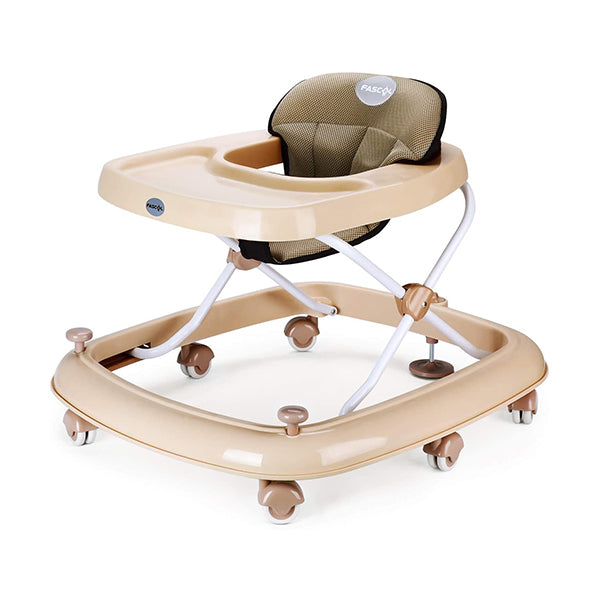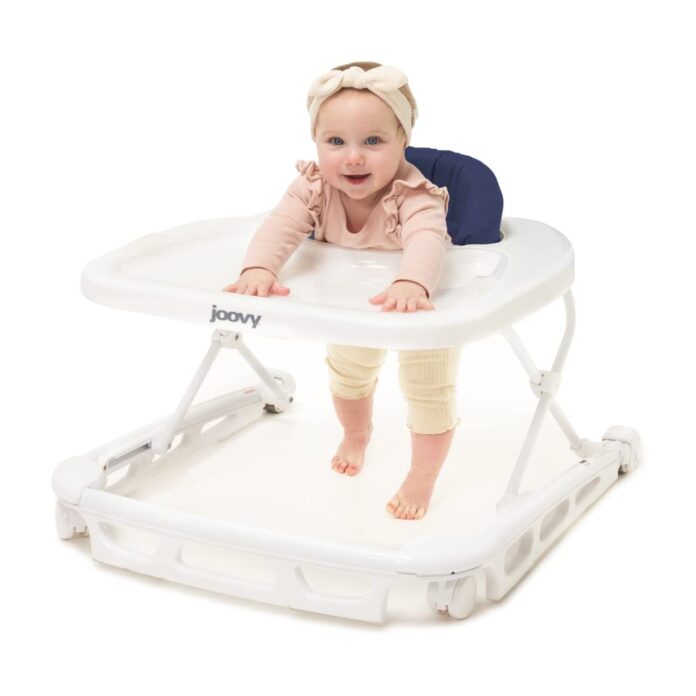Looking for the best baby walker? Opt for push walkers for safe and effective muscle development in babies.
Sit-in walkers with wheels can hinder physical development, but push along walkers are a reliable alternative that promote strength and readiness for standing and walking. Pediatricians warn against traditional baby walkers, suggesting push toys as a safer option. Montessori principles also discourage the use of commercial movement aids like baby walkers.
Consider these factors before choosing the right baby walker: safety, cost, types available, weight limits, optimal size, popular brands, and materials used to make the walker. By prioritizing safety and development, you can select the best baby walker for your little one’s needs.

Credit: babygo.uk
The Safety Debate
When it comes to baby walkers, the safety debate is a hot topic among parents and experts alike. Let’s explore what pediatricians and Montessori have to say about the safety of baby walkers.
Are Baby Walkers Recommended By Pediatricians?
Many families believe that baby walkers aid in a child’s walking development. However, pediatricians emphasize that walkers offer minimal benefits and could potentially hinder a child’s progress.
What Montessori Says About Baby Walkers
In line with the Montessori philosophy, commercial movement aids like baby walkers may impede a child’s natural development by providing mobility before they are physically ready.
Instead of traditional sit-in walkers, Montessori suggests opting for sturdy push toys that support a child’s physical growth without compromising their development.
Choosing The Right Walker
When it comes to choosing the right walker for your baby, it’s important to opt for a push walker instead of a sit-in walker with wheels. Push walkers promote muscle activation and strength development, ensuring your baby takes their first steps at their own pace.
What Type Of Baby Walker Is Best?
Sit-in baby walkers with wheels are considered dangerous and detrimental to a baby’s physical development. However, push walkers are a safe and reliable alternative. A push along walker enables regular muscle activation and strength development and only works when the baby is ready to stand and take their first steps.
According to a pediatrician, walkers do little good for a child’s development and may even delay it. So, it is important to choose the right type of walker for your baby to ensure their safety and proper growth.
What To Get Instead Of A Baby Walker?
An excellent alternative to traditional baby walkers with wheels is a wooden push toy. These sturdy push toys provide support for the baby to hold on to while enabling them to practice and develop their walking skills. It is crucial to select a push toy that has a bar for the baby to hold on to and ensure that the toy won’t tip over while in use.
Walkers, and other commercially available movement aids, can hinder development. They make a child mobile so quickly that sometimes they give up on their own attempts to walk when outside the walker. Therefore, it is advisable to opt for a push toy that encourages your baby’s natural development and independence.
References:
Buying Guide: Baby Walkers Safety
When it comes to baby walkers, safety should be the top priority. It is crucial to choose a walker that provides proper support and encourages natural development. Here are a few factors to consider before making a purchase:
- Sturdy Design: Select a walker with a durable and stable design to ensure your baby’s safety while they learn to walk.
- Height Adjustability: Look for a walker that offers height adjustability to accommodate your baby as they grow.
- Wide Base: A walker with a wide base provides better stability, reducing the risk of tipping over.
- Wheel Locks: Opt for a walker that has wheel locks to prevent it from moving on uneven surfaces.
By considering these factors and opting for a push along walker instead of a sit-in walker, you can provide your baby with a safe and supportive tool to aid their walking journey.
How Much Does A Baby Walker Cost?
The cost of baby walkers varies depending on the brand, design, and features. Generally, baby walkers can range from $50 to $150. However, it is important to prioritize safety and quality over price when choosing the right walker for your baby.
Safety First
Safety First: Best Baby Walkers for Your Little One
What Is The Safest Walker For Babies?
Choose push walkers over sit-in walkers for safer movement and development.
Are Baby Walkers Bad For Baby’s Hips?
Avoid sit-in walkers with wheels as they can affect a baby’s hip development negatively.
When it comes to your baby’s safety, the type of walker you choose plays a crucial role. Instead of traditional sit-in walkers, consider opting for push walkers that promote strength development and muscle activation at the baby’s pace.
- Sit-in walkers with wheels might hinder the baby’s physical development.
- Push walkers encourage standing and independent steps when the baby is ready.
It is essential to prioritize your baby’s safety and well-being by selecting a walker that supports their natural development without compromising their physical health. Always consult with pediatricians to make informed decisions regarding your baby’s mobility.
Montessori principles suggest avoiding commercially available movement aids like walkers, as they can hinder a child’s independent progress in learning to walk.

Credit: www.todaysparent.com
Cost And Features
When searching for the perfect baby walker, considering the cost and features is crucial. This ensures you get the best value for your money and a walker that meets your little one’s needs. Let’s delve into the cost and features of baby walkers to help you make an informed decision.
How Much Does A Baby Walker Cost?
The cost of baby walkers can vary based on the type and features. Sit-in baby walkers can range from approximately $38.49 to $139.99, while push along walkers typically range from $55.19 to $99.99. It’s essential to consider the safety features and developmental benefits when assessing the cost of a baby walker.
What Are The Different Types Of Baby Walkers?
When exploring baby walkers, it’s important to consider the type that best suits your child’s needs. While sit-in baby walkers with wheels are discouraged due to safety concerns and potential hindrance to physical development, push walkers are recommended as a safe and effective alternative. Push along walkers encourage muscle activation and strength development, promoting a child’s readiness to stand and take their first steps.
What Is The Maximum Weight For A Baby Walker?
The maximum weight capacity for baby walkers can vary depending on the specific model. It’s essential to refer to the manufacturer’s guidelines to ensure the walker is suitable for your child’s weight. By adhering to the weight limits, you can maximize the safety and effectiveness of the baby walker.
How Big Does A Baby Need To Be For A Walker?
Babies should meet the developmental milestones of being able to support their own weight and stand with assistance before using a walker. Typically, when a baby is able to stand and take steps with assistance, they may be ready to benefit from a push along walker. Always consult with your pediatrician to determine if your baby is developmentally ready for a walker.
Popular Brands And Materials
When it comes to choosing the best baby walkers for your little one, it’s important to consider the popular brands and the materials used in their construction. Here, we will take a closer look at some popular brands of baby walkers and the materials commonly used in their production.
Popular Brands Of Baby Walkers
There are several popular brands that have gained recognition for producing high-quality baby walkers. Some of these renowned brands include:
- Walker Blue: Available at Walmart for $59.99 with free shipping.
- Nuby USA Walker: Priced at $69.99 and offered with free shipping on Amazon.com.
- Elephant Baby Walker: Sold for $139.99 by Maisonette.
- Baby Einstein Sky Explorers Walker: Available on Amazon.com at a discounted price of $38.49.
- Chicco Mod Infant Walker: Priced at $79.99 and highly rated.
Materials Used In Baby Walkers
Let’s explore the materials commonly used in the construction of baby walkers, ensuring safety and durability for your little one:
- Wooden: Wooden baby walkers, such as the one offered by Nuby USA, provide a sturdy and eco-friendly option for your child’s early steps.
- Plastic: Many baby walkers are constructed with high-quality, non-toxic plastics to ensure safety and ease of cleaning.
- Fabric: Some baby walkers feature soft, washable fabric seats for added comfort and support during playtime.
- Metal: Sturdy metal frames offer stability and strength, making it a reliable choice for active little ones.

Credit: www.healthline.com
Frequently Asked Questions
What Type Of Baby Walker Is Best?
The best type of baby walker is a push along walker. Sit-in walkers with wheels can be dangerous and hinder a baby’s physical development. Push along walkers promote muscle activation and strength development, and only work when the baby is ready to stand and take their first steps.
Do Pediatricians Recommend Walkers?
Pediatricians do not recommend walkers for babies as they can delay development and are unsafe. Instead, push walkers are a better option for muscle activation and strength development.
What Should I Get Instead Of A Baby Walker?
A sturdy push toy is a safe alternative to a baby walker, promoting muscle strength and balance. Look for a toy with a secure handle and ensure it won’t tip over during use.
What Does Montessori Say About Walkers?
Montessori discourages the use of walkers as they hinder a child’s natural development. Walkers make a child mobile too quickly, leading them to give up their own attempts. It’s best to avoid commercially available movement aids and encourage natural development.
Conclusion
With a focus on safety and development, push walkers emerge as the ideal choice for babies. Pediatricians advise against traditional sit-in walkers, emphasizing the importance of natural muscle activation for standing and walking readiness. Opting for sturdy push toys instead can promote physical growth and learning milestones effectively.




